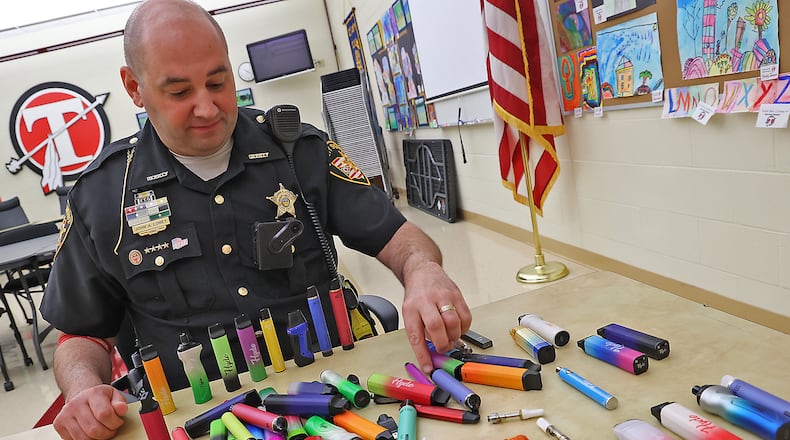More than 2 million young people across the country used E-cigarettes products, including vapes, in 2021, according to the Centers for Disease Control and Prevention.
In 2019, 47.7% of Ohio high school students used vapor products. In comparison, 50.1% used them nationally, according to data from the CDC’s Youth Risk Behavior Surveillance System survey, which monitors health behaviors and experiences of students in the country.
There’s no data available for the number of young people who use those products locally. But area districts such as Tecumseh, Springfield, Northeastern and Triad say they’ve expelled and suspended record numbers of students who are caught vaping in school.
“This is happening in our restrooms all throughout the high school, it’s happening in our restrooms at the middle school, it’s happening in our elementary school,” said Tecumseh schools Superintendent Paula Crew. “We have students that are coming to school with vapes in third and fourth grade.”
A vape is a device that heats up liquid to create a vapor that the user inhales. They look like regular cigarettes or cigars while others resemble pens and flash drives.
Although e-cigarettes contain up to half the nicotine found it cigarettes, they have many health risks for adolescence, according to the CDC. Nicotine can harm parts of the brain that control attention, learning, mood and impulse control, the agency said. In addition, it’s highly addictive, and young people who vape are more likely to be smokers as adults.
“We need your help with our students,” Crew said. “We need the partnership with our parents to help with alleviating the epidemic of vaping in the school setting.”
Vapes, which come in different flavors, colors and sizes, are being market towards younger kids, said Clark County Sheriff School Resource Officer John Loney.
“They’re being marketed towards our students… and talking with the other SROs in the county, they also are experiencing this problem too,” he said.
Tecumseh has had five students this year transported to hospitals by ambulance because they had a bad reaction to vaping and their vital signs increased. The district has also had repeat offenders and expelled 11 students for vaping THC oil so far. Crew said the district has surpassed the number of expulsions in the last decade combined.
“If you are a repeat offender with this and you come to my office twice, you will be expelled,” she said. “We need to get the drugs out of our schools, and we need to get the nicotine out of our schools.”
When students are expelled due to vaping or drug use, they lose all their credits, and they can’t enroll in any other public or private school. Students who get caught vaping are required to take VapeEducation, an online learning program. The Clark County Combined Health District will also present a vape education class to all students at the middle and high schools by the end of the year.
To help prevent vaping in school, Tecumseh has purchased two HALO devices for the middle and high school restrooms, which measures the air quality including vaping nicotine or THC and are monitored daily.
“It detects the vape and sends that information to Deputy Loney and the principal’s phones that there’s vaping going on,” Crew said.
One HALO vape detector device costs $1,095. The district applied for a safety grant through the Attorney General’s office for additional devices, and were recently awarded nearly $15,000 to install 14 devices over the summer in the middle and high school restrooms.
Springfield, Northeastern and Triad have also seen an increase in students vaping.
Springfield Communications Specialist Jenna Leinasars said the district focuses on informing and educating students about the dangers of vaping, which begins at home.
“Many times, it is discovered that a student who is caught vaping has taken the vape from an adult who they live with,” she said. “The district encourages parents and guardians to have open conversations with them about healthy habits and potential consequences of using addictive substances.”
During the school days, teachers do restrooms checks because that’s where students have been most likely to be caught vaping. The consequences depend on the severity and frequency of the incident but can include the items being confiscated and an administrator calling the student’s parents. The district also tries to use restorative practices instead of punishments.
“For example, a student who is caught vaping will be offered the opportunity to write a research paper about the negative effects of vaping in lieu of punishment,” Leinasars said.
At Northeastern, they use a program called VapeEducation, which is an immersive curriculum that takes students about three hours to compete, as well as teaching healthy lifestyle habits and the dangers of vaping in the health curriculum, to help prevent students from vaping or to help them quit.
“(We) have seen an increase in students vaping and take disciplinary action when students are caught on school property. As a district, we work with our students and their parents or guardians to educate them on the dangers of vaping,” said Superintendent John Kronour.
Triad Superintendent Vickie Hoffman said this has been an issue all year. There have been 18 suspensions due to vaping, compared to 10 last year.
“Students get a three-day out of school suspension on their first offense of having a vape device or vaping, and the punishment escalates each time,” she said.
Hoffman said the district is working to change policies as well as add programming with outside agencies.
“We are working to change our policies to educate students about this dangerous behavior and then consequences after… talk to your children, explain the dangers of vaping,” she said.
About the Author


